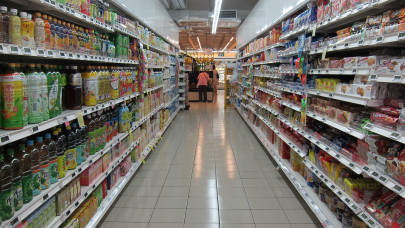The highest inflation in the EU, the one recorded for the second consecutive month in Romania, has greatly diluted people's incomes, and the effects are seen in the significant decrease in trade sales, the most important engine of the economy.
According to data from the National Institute of Statistics, the volume of turnover in retail trade (excluding trade in motor vehicles and motorcycles), gross series, decreased, overall, by 17.2% in January 2024, compared to the previous month .
Trade in food products, beverages and tobacco decreased by 22.2%, fuel sales were lower by 14%, and trade in non-food products decreased by 13.9%.
"It is the strongest trade correction in recent years, anticipated by the significant tempering of sales in previous months. In the month of December, considered the peak of sales over the year (Christmas, New Year's Eve, etc.), retail trade decreased, in adjusted series, compared to November 2023, by 0.2%. The data from January confirm the worrying trend'', the analysis of the consulting company shows.
The significant drop in retail is all the more alarming as it comes in the context of tax increases that come into effect on January 1, 2024.
”The increase in VAT on healthy food products, the increase in taxes on sugar products, drinks and tobacco, together with the increase in business taxes and the extension of the cap on the commercial addition had a boomerang effect. Instead of leading to an increase in revenue, they contributed to a decrease in sales, a fact that proves, if it were needed, that when you increase taxes in a period of crisis, revenue drops precipitously, an element of the economics textbook,'' says Adrian Negrescu, the Frames manager.
Why is retail important?
Retail trade and distribution is essentially the most important contributor to GDP formation, 21% in 2022, and revenues from this sector represent approx. 40% of total income from the economy.
In the last 15 years, the retail and distribution sector has paid RON 448 billion in taxes and duties, half of which is VAT and 36% labor contributions. About 12%-13% of all fees and taxes collected in the public budget come from this sector, the largest contribution at the national level.
"That is why the negative trend noted by the statistical data is extremely important. Because it shows that the economy is going through a period of crisis, hit by the treacherous disease - inflation, for which it seems we don't have an effective treatment,'' Negrescu said. The retail and distribution sector in Romania employs over 800,000 employees (2022).
Ceilings, ineffective
The data on the evolution of inflation, announced by the Institute of Statistics, confirm that the caps decided by the government on energy, gas and basic food are not working, proof that we have, for the second month in a row, the largest price increases in the EU, fact confirmed by EUROSTAT data.
"Inflation in Romania is at a double level compared to Western countries. In Poland, a country with which we like to compare ourselves, inflation is only 4% compared to 7% here. What did they do and we didn't to have lower inflation? First of all they reduced the VAT on food to zero and did not impose those huge price thresholds on energy and gas. In our country, all the measures taken lately have done nothing but add gas to the fire of inflation - Romania has, for example, the highest energy price in the EU for companies'', Frames analysts say.
Statistical data indicate that the private sector has tried to minimize costs in order to keep price increases in check.
According to Frames' analysis, the gross margin (plus) of the top 10 domestic retail players has fallen significantly in recent years, from 18% 10 years ago to 11% in 2022, the last year for which final financial data is available from the Ministry of Finance.
”2023 brought an even wider drop in retailers' margins, aware that price increases are like a rubber band. If they pull too much from the prices, the rubber band breaks, meaning I'm left with unsold merchandise. In essence, the optimization of operational costs and the focus on promotions came to the fore, against the background of the strong decrease in the purchasing power of customers'', the analysis shows.
Statistics show, for example, that, at a turnover of RON 83 billion in 2022, the first 10 retailers in Romania recorded a net profit of only RON 2.5 billion.
RON 74 billion were expenditure on goods, and RON 5.87 billion represented the salaries of almost 80,000 employees (the first 10 retailers).
"Limiting the addition to basic food products was just an artifice of image. In reality, many of the retailers, especially in the modern trade sector, were already practicing a markup below the level established by the authorities. Hence the almost non-existent effects of these measures. The reductions recorded by the INS during the capping period were in their vast majority conjunctural, generated by seasonality and the dynamics of logistics,'' Negrescu declared.
Wages are no longer keeping up with inflation
According to the Frames analysis, the worrisome dynamics of Romanian retail is primarily related to the accelerated decrease in the population's income, significantly affected by inflation.
Even if compared to the European average, the minimum wage in Romania has grown twice as fast in the last 5 years (65% in Romania, vs 35% in the EU), it now represents only 54% of the minimum wage in the EU (vs 45% 5 years ago).
The minimum salary is approx. €663 gross, while the EU average of €1,218.
The latest data from the National Institute of Statistics confirm an accentuation of the negative tendency to decrease purchasing power.
In January 2024, the average gross salary was RON 7976, RON 325 (-3.9%) lower than in December 2023. On net, the average salary decreased by RON 220 (-4.3%), at RON 4859.
"So, the problem comes from the size of the salaries, not from the price of the products or the surcharge applied. It proves that, according to EUROSTAT data, the average price of consumer products in Romania represents 59% of the EU average'', the Frames analysis shows.
An alarm signal
The official statistics paint a picture of a significant economic crisis towards which we are heading.
After a first quarter of economic decline (Q4 2023), if we also have economic decline in the first three months of 2024 (Q1 2024), this essentially translates into the notion of a technical recession.
"The Romanian economy is currently operating with the handbrake pulled. Tax increases, e-invoices and inflation have further accentuated the problems on the economic chains, and the prospects are increasingly uncertain,'' say the analysts.
Even if Romania avoids recession, the economic dynamics has and will suffer, especially since the prospects of 2025 indicate new tax increases.
"They are talking about increasing VAT from 19 to 21%, about increasing the income tax rate from 10 to 16%, about increasing local taxes. All this will bring inflation back to the fore, and the NBR's efforts to curb price increases, which will be seen in Q2 2024, will become useless.
An increase in VAT in 2025, for example, will put even more pressure on consumption. Instead of tax increases, we should support retail, reduce labor taxes and stimulate consumption, this beyond the absorption of European money'', says Negrescu.
"If retail continues its negative evolution, against the background of the authorities' crazy ideas (ceilings, compensations and other fiscal measures), the effects may be proportionate. A simple calculation shows, for example, that considering the number of employees, retail generates contributions for the payment of 15% of current pensions (approx. 750,000 pensioners)'', he added.
The Frames analysis was carried out on the basis of a business study carried out by the consulting company dedicated to companies with CAEN code 4711 - Retail trade in stores that have, apart from their main sales of food products, drinks or tobacco, several other types of goods , such as clothing, furniture, household appliances, hardware, cosmetics, etc.
The processed data refer exclusively to companies that have this main activity code and are obtained from the Trade Register and the Ministry of Finance based on the public information declared by the companies and Frames estimates. The analysis also includes official INS, CNP and Eurostat data.











